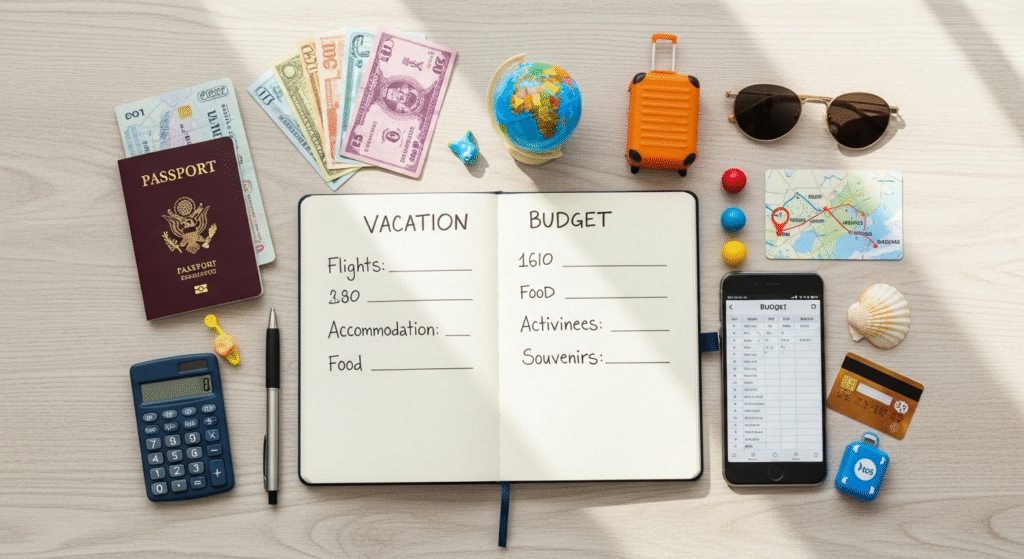
Budgeting for Family Vacations is essential for enjoying quality time together without financial stress. Proper planning ensures that every part of your trip from flights to meals fits comfortably within your means. Many families skip vacations because they fear overspending, but with a clear plan, you can balance fun and finances easily. A good vacation budget helps you prioritize what truly matters: making memories, not worrying about money.
By setting saving goals early and tracking expenses during the trip, you can enjoy your vacation guilt-free. Budgeting also helps you avoid debt and unexpected costs, keeping your financial situation stable. In this guide, you’ll learn practical ways to plan, save, and spend wisely so every family getaway remains both joyful and financially balanced.
Setting Realistic Vacation Goals
Budgeting for Family Vacations begins with setting realistic goals that match your family’s financial situation. The first step is to decide what kind of vacation fits your budget — whether it’s a local weekend getaway, a national park adventure, or a full international trip. Every family is different, and choosing a vacation type that aligns with your finances ensures you don’t overspend or come home stressed about money.
When planning, consider your family’s interests and priorities. Some families love beach trips, while others enjoy mountain retreats or city explorations. Choose a destination that offers fun activities without exceeding your budget. Affordable doesn’t mean boring — many budget-friendly destinations offer great experiences like free attractions, nature trails, or cultural events.
It’s also important to align your vacation goals with your savings and income level. If funds are tight, plan shorter trips or travel during off-seasons when prices are lower. Create a clear financial plan that includes how much you can save monthly toward the trip and how much you’re comfortable spending once there. By being realistic, you’ll make smarter decisions that allow you to enjoy quality family time without financial strain.
Creating a Vacation Budget

A solid Budgeting for Family Vacations plan always includes a detailed budget. Start by estimating your total travel costs, this should cover transportation, accommodation, meals, entertainment, and extra expenses like souvenirs or tips. Getting a clear picture of your total spending helps prevent surprises later.
Before booking anything, set a maximum spending limit based on your savings and income. This number should reflect what you can comfortably afford without dipping into emergency funds. When planning, use online tools, budgeting apps, or simple spreadsheets to track every expense category. This helps you see where your money goes and identify areas where you can save.
Include small allowances for unexpected expenses, like last-minute snacks or parking fees. Family trips often come with unplanned costs, so having a cushion helps keep your finances stable. Compare estimated versus actual spending daily during your trip to stay on track.
Saving for the Vacation Early
The smartest way to handle Budgeting for Family Vacations is to start saving early. Setting up a separate “vacation fund” account helps you stay organized and prevents you from using money meant for bills or emergencies. Automate monthly deposits into this account even small contributions add up over time.
Consider using apps that round up your daily purchases and automatically save the extra change. These little savings can make a big difference when it’s time to travel. You can also set family challenges, like a “spare change jar” or “no-spend weekend,” and direct the savings toward your vacation fund.
Involve your children too, encourage them to save small amounts for their own activities or souvenirs. It’s a fun way to teach financial responsibility while getting everyone excited about the trip.
Finding Affordable Travel and Accommodation Options

A key part of Budgeting for Family Vacations is knowing how to find affordable travel and accommodation deals. Start by booking flights and hotels well in advance, prices often rise closer to departure dates. Use trusted comparison websites to check for discounts, coupons, or family-friendly deals.
Be flexible with your travel dates; flying midweek or during off-peak seasons can save a significant amount. If flights are expensive, consider alternative travel options like road trips or train journeys. Sometimes, a nearby destination can offer just as much fun at a fraction of the cost.
When choosing accommodation, explore vacation rentals, hostels, or budget hotels. Many rental homes provide kitchens, allowing you to cook meals and save on dining costs. Some platforms also offer bundle deals combining flights, stays, and car rentals at discounted prices.
Don’t overlook creative alternatives like camping, staycations, or local weekend getaways. These can be exciting, affordable, and less stressful to plan. Look for family travel reward programs or loyalty points that can reduce expenses further.
Smart Spending During the Trip
Budgeting for Family Vacations doesn’t stop once you reach your destination, it continues throughout your trip. Smart spending ensures you stay within budget while still enjoying the special moments that make family vacations truly memorable. One of the best ways to control spending is by setting daily limits for food, activities, and souvenirs. Having a clear daily allowance keeps everyone on track and prevents overspending early in the trip.
Packing snacks, water bottles, and basic essentials can also save a lot of money. Buying snacks or drinks at tourist spots often costs double compared to bringing your own. This small step not only saves money but also keeps the family comfortable and prepared during travel days or excursions.
Track expenses in real-time using a budgeting app or simple notebook. Recording every purchase helps you stay aware of how much you’ve spent and what remains in your daily limit. If you prefer, use cash for certain categories — paying with cash helps you become more mindful about spending since you can physically see your money going out.
Avoid impulse buys by planning in advance what souvenirs or extras you’ll buy. Remember, experiences matter more than things. Smart spending allows you to enjoy your vacation fully without financial stress when you return home. Staying aware of expenses ensures your Budgeting for Family Vacations plan succeeds all the way through.
Free or Low Cost Fun Ideas

A great part of Budgeting for Family Vacations is discovering free or low-cost activities that still create amazing memories. Not every fun moment has to come with a big price tag. Many destinations offer free attractions such as local parks, beaches, hiking trails, or historical sites. These experiences often turn out to be more memorable than expensive tours.
Check out local community calendars for free family-friendly events, like outdoor concerts, local festivals, or art fairs. These events give your family a chance to experience the local culture without straining your wallet. Libraries, museums, and cultural centers often have free entry days or discounts for families.
Exploring nature-based activities such as picnics, nature walks, or swimming at public beaches provides relaxation and fun at little to no cost. Consider using online travel forums or apps that list free attractions and local experiences in your area.
Teaching Kids About Vacation Budgeting
One of the most valuable lessons of Budgeting for Family Vacations is involving your children in the process. When kids understand money’s value, they become more thoughtful about spending and saving. Start by including them in planning discussions, talk about how the family saves for vacations and why it’s important to stick to a budget.
Give each child a small allowance for souvenirs or treats during the trip. This teaches them decision-making, prioritization, and financial responsibility. Encourage them to compare prices, save for something special, or spend wisely instead of impulsively.
You can also make budgeting fun by setting small challenges, like who can find the best free activity or the most affordable meal option. It turns financial awareness into a family game while promoting teamwork.
Post Vacation Financial Check In
After returning home, an important part of Budgeting for Family Vacations is doing a post-trip financial review. Sit down as a family and go over your total expenses compared to your planned budget. This helps you see what worked well and what areas went over the limit.
Analyzing your spending gives valuable insight for future trips. Maybe you spent more on meals but saved on activities — or maybe you found better deals by booking early. Use this information to adjust your budget and savings plan for the next vacation.
Reviewing your finances also helps you understand how the trip impacted your overall budget. If any expenses went onto credit cards, plan how to pay them off quickly to avoid interest. You can also start setting aside small amounts for the next vacation immediately to stay ahead.
Conclusion
Budgeting for Family Vacations helps you enjoy quality time together without financial stress. With careful planning, smart saving, and mindful spending, you can create unforgettable memories while staying within your means. Every trip becomes more enjoyable when you know your finances are under control. From setting goals to reviewing expenses afterward, each step builds better financial habits for your family. Remember, the best vacations aren’t about how much you spend but how much joy and connection you create. By balancing fun with smart budgeting, you ensure every getaway strengthens both your family bond and your financial stability for future adventures.
FAQs
Why is Budgeting for Family Vacations important?
Budgeting for Family Vacations is important because it helps you enjoy quality time with your loved ones without financial stress. By planning expenses ahead, you can control spending, avoid debt, and focus on making happy memories. A good vacation budget also ensures you can afford activities, food, and accommodations without overspending. It allows your family to travel more often and enjoy every trip responsibly, knowing you’ve stayed within your financial limits.
How can I start Budgeting for Family Vacations effectively?
To start Budgeting for Family Vacations, begin by setting clear goals and estimating total costs for travel, stay, food, and activities. Next, create a dedicated vacation fund and save regularly, even small amounts. Use budgeting apps to track expenses and stay organized. Planning early gives you time to find deals on flights and accommodations. By setting limits and saving ahead, you can make your family vacation enjoyable, affordable, and free from financial worry.
What are some common mistakes to avoid when Budgeting for Family Vacations?
When Budgeting for Family Vacations, avoid mistakes like not setting a spending limit, ignoring hidden costs, or waiting too long to book. Overspending on luxury items or impulse purchases can also break your budget. Forgetting to plan for emergencies or unexpected expenses often leads to stress. To prevent this, set clear limits, keep track of spending daily, and prioritize experiences over expensive extras. Smart preparation ensures your trip stays fun and financially balanced.
How can I make Budgeting for Family Vacations fun for kids?
Making Budgeting for Family Vacations fun for kids helps them learn valuable money lessons. Involve them in choosing destinations or planning activities. Give them a small budget for souvenirs and let them decide how to spend it. You can also set family saving goals or challenges, like adding loose change to a vacation jar. This makes budgeting exciting and teaches children financial responsibility while encouraging teamwork toward a shared family adventure.
Can Budgeting for Family Vacations still allow for spontaneity?
Yes, Budgeting for Family Vacations can still include room for spontaneity. The key is to plan your main expenses while leaving a small part of your budget for unplanned activities or treats. Setting aside a flexible amount ensures you can enjoy surprises without worrying about overspending. This approach gives you the freedom to explore new experiences while keeping your finances secure, making your vacation both well-planned and delightfully spontaneous.
